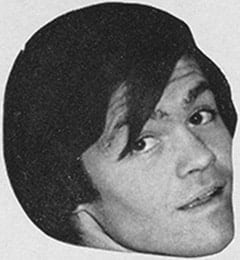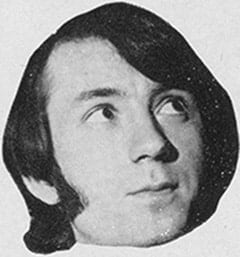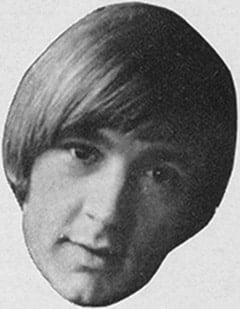Now let’s go back to the second senior member of the Monkees, Peter Tork. He was 16 when he got his first guitar. He made very rapid progress with learning all the different chords. He usually practised by playing along with different records on the radio and, although he cannot remember the exact moment, Peter recalls that it was during this period at school that he made up his mind to become a professional entertainer.
“All kinds of things happened when I went through the senior year of high school,” recalls Peter. “Main thing was that I finally got a real chance to make friends among the other kids. Before that, I’d always been younger than my classmates, and you know kids… they don’t like getting involved with someone who is junior. A year makes a heck of a difference in school—Don’t anybody try to tell you different.”
But eventually he got into a new school and found himself in company with his own age group. “This is when I guess you could say I blossomed out,” he says. “There were all kinds of different societies I could join like the dramatic society—and the rifleshooting club. I was a pretty good shot and my dad encouraged me by getting me my own rifle and set up targets for me.
“But what brought me down was the dramatic thing. See, I’m pretty well six feet tall now, but those extra inches came late in my teens. Around high school time, I was a lot shorter and this meant that I didn’t get the big romantic lead parts in our productions. Mind you, I really went for comedy more, but I always figured I deserved something a bit better than the part of a thirteen-year-old paper-seller in ‘Our Town’, which was my acting debut! Thirteen-year-old—and there was I, getting on for sixteen-and-a-half. I felt somehow this was kinda degrading specially after I’d always been genuinely the young-one-out at school.”
French horn Permalink
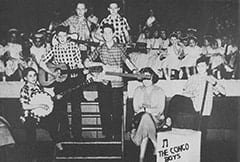
Look through the potted biographies of Peter and you will see that he lists French horn as one of the instruments he plays. This isn’t a put-on. In his senior year at high school, he took a crash course on the instrument and was rewarded with a place, though a rather lowly place, in the French horn section of the University of Connecticut orchestra. Although Peter wouldn’t admit it himself just getting to “blow” in the band was a terrific honour because generally speaking they only recruited college students. And Peter had quite a while to go before he actually got to college.
Pop music was not really his bag at this time. Folk, yes; orchestral, yes. But then came the Beatles to change his mind.
When Peter Tork does a thing, he does it well—you know that’s true from the way he grabs hold of a situation on the television series and extracts the very last bit of comedy out of it.
“Even getting kicked out of College was something I had to throw myself into better than anybody else,” he says with a self-effacing grin. “I didn’t just get kicked out—I got kicked out twice!”
How come? Blame it on the Beatles. And let Torkie himself explain. “I was hung up on the orchestral music we played at school. Pop music seemed all… well, kinda drab. The hard-core rock ’n roll era had ended and all the excitement had gone. Music was getting boring. You listened to the records of the day and mostly it was a drag scene. I believed that music at pop level COULD be exciting again. And those Beatles came up and proved it to me…
“So at College I got to feeling I’d like a career in this new-wave pop music. I didn’t shout my head off about my enthusiasm ’cos the other guys would have laughed. But it occupied my time… practising on different instruments, daydreaming about maybe sometime being a star myself. So in my second term at College I had a rather painful interview with the principal. He said my scholastic progress was not good enough. He flunked me. And I went home for another painful interview with my dad.”
Dad being a professor and keen for his boy to do well in College—well, he didn’t like this flunk-out scene one little bit. But Pete was old enough to find a job and he did just that—picking up a few bucks a week working in a local thread factory.
“So it was a boring job,” says Pete now. “But I met up with a lot of guys, most of them much older than me, and that way I guess I was really educating myself. I was there a little over a year, making friends at long last, and I can honestly say I enjoyed it. Then I decided to give college another go. You know how it is, after you’ve left school you start wishing you’d paid more attention while you were there. Happens to kids all over the world.
“But after my first year back at college, my exam results slipped again. The Beatles don’t get ALL the blame this time—I was out doing dance-dates and concentrating far too much on my own pop music. This time I flunked like one hundred per cent. That was the end. I had to level with myself and appreciate that I just didn’t care enough about mere scholastic ability. I had something inside me wanting to get out and it was all to do with music.”
Fancy free Permalink
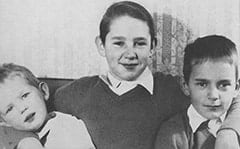
So Pete, footloose and fancy-free, went off to Greenwich Village—a way out part of New York—to become a professional entertainer. Fancy-free? Well, he’d dated many different girls but his romance with the main one, Hilary Dirlam, had ended. This sweet girl, attractive and quiet, was an enthusiastic singer and often she and Peter would spend whole evenings together, just working on their own arrangement of the songs of the day. Sure they talked marriage talk; but they were both very young and Peter says the romance just went on to a friendly conclusion. He still writes her, but just as a friend.
And so Peter, fancy-free as we’ve said, ended up in Greenwich Village. We nip back in time a bit to pick up with the boisterous Micky Dolenz, who we last left struggling with his studies at North Hollywood Junior High School. He was already a recognisable “face” on the scene, of course, through his work as Corky in the TV series “Circus Boy”. Seems that all the Monkees had troubles with their schooling, but Micky’s were to some extent the MOST troublesome because his work schedule had been so badly disorganised by his TV work.
Hear Micky on this subject. “At junior high school, I often got sent to the electric chair. Think I’m kidding? Well, this is how it worked out. The science teacher had a bit of difficulty keeping some of the kids in order. As I was a grade one baddie as a kid—always showing off—he used to have to try and put me down. So he rigged up this special chair, just like all the others only it had a battery fixed and it would shoot a little charge of electricity through it. Only a couple of volts or so, but it was enough to be uncomfortable and give you a nasty tingling feeling right up your spine.
“I used to spend a lot of time in that chair. I guess I thought it was a bit of a joke thing, but eventually I got to realise that it was a bit of a disgrace being made to sit in there, away from the other kids. So the science teacher won his battle. I started paying attention and I can, even now, remember more about science than any other subject I took at school…”
Private tutor Permalink
But, by the time Micky had got to High School proper, he had missed two years because of television. The State Board of Education insisted that he had a private tutor while filming and this solo education helped him a lot. In fact, he was nearly two years younger than most of his class-mates at the High School. And he’d already produced a complete pop-singing act for himself.
This really stemmed from the “Circus Boy” series. The stars often went out on personal appearance tours to help promote the series and the adults used to get up and tell jokes and anecdotes—though Micky was too young to get away with this sort of thing. So he was encouraged to learn guitar and also to pick up songs popular at that time—like “Witch Doctor”, “Purple People Eater” and so on. This little guy, with his blonde hair really put on a cute show. He sang pretty well in tune and pulled mischievous faces and everybody thought he was a gas!
All this was behind Micky when he got to High School. But being younger than the others had its disadvantages. Like not being able to drive a car—even though he was one of the most enthusiastic girl-daters in the school. “I could get the girls but I couldn’t take them anywhere,” says Micky. “So, I had to rely on my pals for a lift. But double-dating is always a bit of a drag.”
Picture the scene of Micky on a date. He’d seen plenty of movies involving the romantic figures of the time, so he had some useful ideas on how to win the chick. Like turning up at her house to call for her and, armed with his guitar, serenade her with a gentle love song, delivered from the front lawn. Mostly this sort of romantic treatment went down very well—and Micky owns up to enjoying hamming it all up. Occasionally though he got into terrible trouble with parents who objected most strongly to the way Micky drew puzzled stares from the neighbours.
More next month
